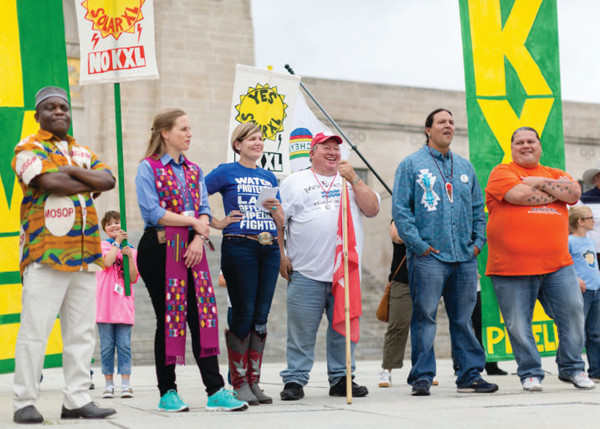
PHOTO/ALEX MATZKE
By Art Tanderup, as interviewed by Sandy Reid
Editor’s note: Art Tanderup, of Bold Nebraska, a group fighting construction of the Keystone XL pipeline, talks with Sandy Reid of the People’s Tribune about the final public hearings on the proposed pipeline route through Nebraska. In previous articles Art has described the potential for danger to the Ogallala Aquifer, the largest fresh water aquifer in existence, and the destruction of native lands and farmlands by the pipeline.
“There was a big rally of pipeline fighters and water protectors on the steps of the state capital on August 6, and a march with lots of speakers and banners. We had the Native American horse riders that were made famous in Standing Rock come down and they rode the ponies. It was an awesome event, which included a press conference. By far, the public did not come to support TransCanada.
“At the public hearing, landowners, tribes, Bold Nebraska, our lawyers and others put up fantastic arguments against the pipeline. I think they all did a great job of educating the Public Service Commission, which makes its final decision by November 23. Landowners talked about problems with reclamation, the poor soil and danger to the aquifer. One of the sad things about the way the law was written on this process is that we couldn’t talk about potential spills or leaks. TransCanada lobbied heavily with our state legislature and when the actual rules were written, the deck was stacked. For example, we could talk about water as long as it didn’t relate to a spill, and we couldn’t talk about the one-sided easement that leaves pipes in the ground forever. They limited the testimony of the tribes, which I thought was a terrible thing to do. The cultural part, artifacts, Trail of Tears, campsites and burial grounds is a real concern and we don’t think it got adequate discussion. In discussion with the Ponca Chairman and their lawyer, all agree that depending on how you look at the map, the pipeline crosses the Trail on two locations and the third is questionable. The Ponca Trail of Tears is on our farm and crosses on the next farm over. This is a big issue for us. Also, the lawyers brought out that TransCanada has so many layers within its corporation that if they go broke, or bankrupt, liability will be limited.
If approved, Bold Nebraska pledged to fight the pipeline all the way to the U.S. Supreme Court.
Sandra Reid is co-editor of the People’s Tribune.
